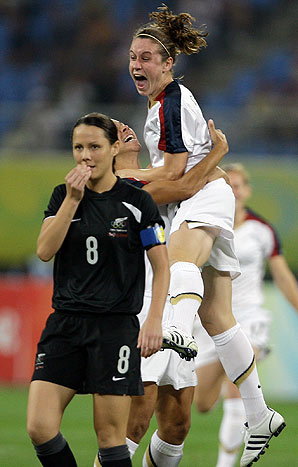Rest of the world hasn't caught up to United States in women's soccer
Call me a contrarian, but I don't buy that. Not yet, at least. Not in a sport that has counted only three different World Cup or Olympic champions (the U.S., Germany and Norway) over the past 18 years. Not in a sport that has seen the same Power Trio (the U.S., Germany and Brazil) reach the semifinals of the past three world championships.
All of which makes Japan, the U.S.'s semifinal opponent on Monday (MSNBC, 9 a.m. ET), the most intriguing team remaining in the Olympic field. These Japanese upstarts have reached their first world semifinal in style by thrashing Norway 5-1, beating the host China 2-0 and giving the U.S. all it could handle in a 1-0 loss during the group stage.
U.S. coach Pia Sundhage, a former star player for Sweden, says this is the best Japanese team she has ever seen. "I played them in 1995 [at the World Cup], and it's a huge difference from today," she says. "They're brave enough to knock it around just outside the box. That's something we can learn from them: the movement of the ball and being patient in the attacking third."
"They move the ball so unpredictably in one- and two-touch," says U.S. defender Kate Markgraf, "and they all have numbers going forward so you don't really know where they're going. That's what impressed me most about them in our group play. They were actually a better attacking team than Norway."
But does Japan have what it takes to make a breakthrough for the rest of the world in the knockout games that count most? This may come back to haunt me, but I don't think so. Not yet. Which leads me back to the dubious conventional wisdom that the rest of the world has caught up.
I would amend it to say this: The rest of the world has made important strides in recent years, and those, in turn, have made women's soccer more appealing to watch.
"I think it's a lot about defending, actually," says Sundhage. "If you look at the World Cup last year and even this event, the defending is very sharp, very organized. And then we have players out there that are fit. If you compare the best players and worst players--and the best teams and the worst teams--it's not that big of a difference."
Sundhage cited two teams in particular: Argentina, which lost 11-0 to Germany in last year's World Cup but gave up no more than two goals in a single game in this Olympics; and New Zealand, which came into this Olympics as the lowest-regarded team but managed a 2-2 tie with Japan in the opening game.
But better defending isn't the only reason for the rest of the world's improvement, according to several U.S. players.
"I just think there's confidence within the women on every team," says U.S. defender Christie Rampone. "The speed of play is a lot faster. It's a little bit more exciting to watch, more skillful. Teams are coming with numbers right now in the attack rather than seeing the traditional get-up-the-sideline, cross-it-in [approach] to one player in the box. There are more opportunities to score."
"You have to be more technical on the ball because you can't just lump it forward," says Markgraf.
Or as midfielder Heather O'Reilly argues, "The other teams are matching our athleticism now, and it's about who's playing the best soccer. Coming into this tournament I thought that seven or eight teams could have won this thing, and I'm around these teams all the time. That second wave of teams is very, very close."
How close is a matter for debate. If we accept that the "first wave" of teams is the U.S., Germany and Brazil, then the "second wave" would probably include Norway, China, Sweden, Canada and Japan (the only other teams to reach world-championship semifinals).
Norway, China and Sweden aren't nearly the teams that they were five and 10 years ago. Canada was good enough to take the U.S. to extra time in the quarterfinals here but never looked like a team that was going to win.
And Japan? We'll find out if the Japanese are really ready for prime-time on Monday against the United States. Only when a "second-wave" team actually wins one of these world championships will we be able to say that the rest of the world has caught up in women's soccer. And despite all the improvements in the game, that breakthrough could still be many years away.





